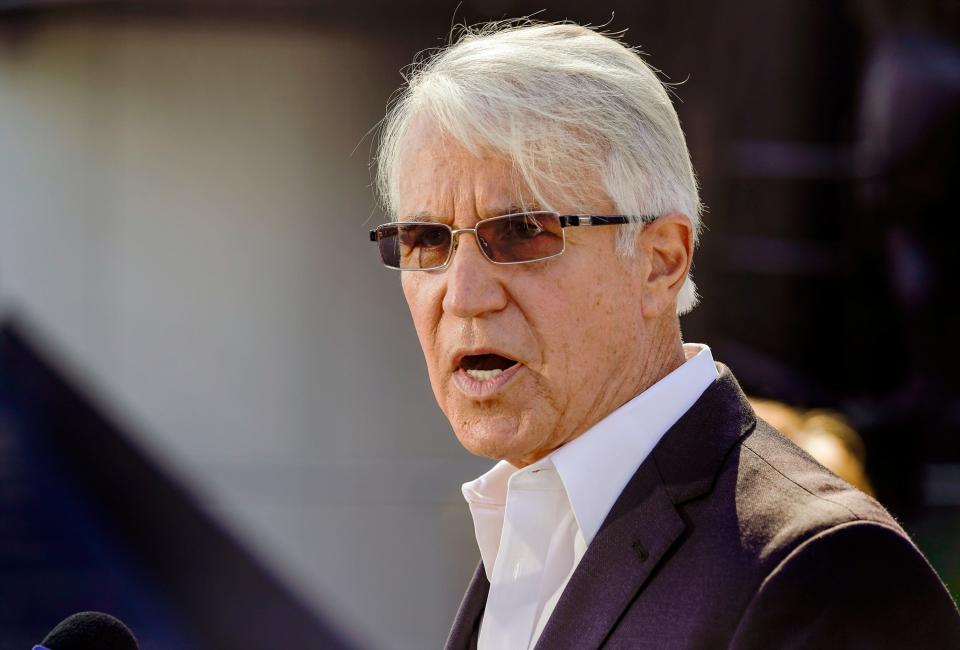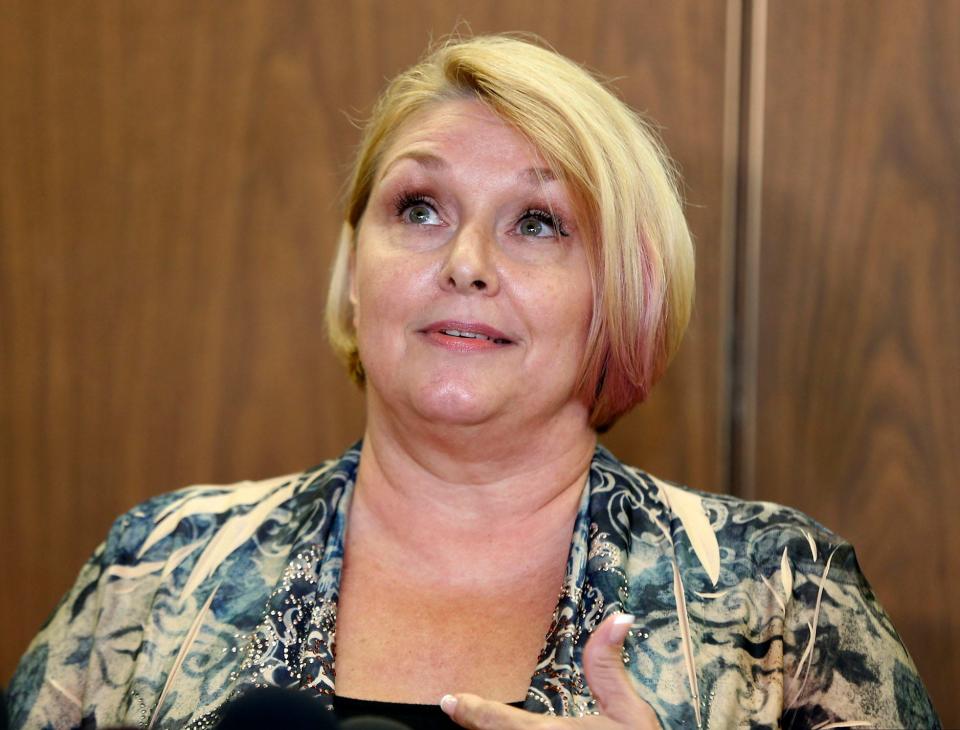Roman Polanski rape case nearing an end? California court orders key document unsealed
- Oops!Something went wrong.Please try again later.
- Oops!Something went wrong.Please try again later.
The underage rape case involving Roman Polanski, the Oscar-winning director and fugitive from justice, may be approaching an end, 45 years after it began: A California appellate court Thursday ordered the unsealing of a key document in the case.
Acting swiftly, the state Court of Appeal in Los Angeles issued its order less than 48 hours after Los Angeles District Attorney George Gascón announced that his office will no longer object, after decades of resistance, to unsealing the document, in the interest of what he called "transparency" and the public's and the victim's right to know.
There are still outstanding questions, such as whether the decades-old document still exists, whether it confirms alleged judicial misconduct in Polanski's case, and when it will be made available to the public.
But the court's order, which included a call for an investigation of misconduct allegations, could hasten a resolution to what has been one of the longest unresolved criminal cases in California history.
Polanski, 88, is "ecstatic," his lawyer, Harland Braun, told USA TODAY on Wednesday, about Gascón's decision to drop his objections to making the document public.
On Thursday, Braun said Polanski is "very happy" that the court's order also "recognized there is a potential for judicial corruption in the case and there’s going to be an investigation."
The document in question is a transcript of a sealed deposition of former Deputy District Attorney Roger Gunson, the original prosecutor of Polanski, and now retired. The director was accused of unlawful sexual intercourse with a 13-year-old girl in 1977, and pleaded guilty to one count.
"The respondent superior court is directed to vacate its order of March 8, 2022 and thereafter issue a new and different order granting the motion to unseal the conditional deposition transcript of Gunson," said the appellate court's order, obtained by USA TODAY.
The court noted that it had expressed concern in an earlier Polanski matter in 2009 about the lack of investigation of allegations of misconduct in the case in 1977 and 1978. Fairness in the criminal justice system is more important than the conviction and sentence of any one individual, the court said then.
"Polanski's allegations urgently require full exploration and then, if indicated, curative action for the abuses alleged here," the court said.
More: Oscar winner Roman Polanski loses his bid for Academy reinstatement
Gunson, according to Braun, was questioned about alleged judicial improprieties in the handling of the case at the time, which were cited by Polanski as the reason he fled the country for Europe in 1978 before he was sentenced.
"Basically, (the document) lays out why he left," Braun said. "(Polanski) is ecstatic. It's the first time there's been any movement in the case. He knows what this transcript says and people are going to be shocked.
"The next question is does (the document) still exist?" Braun added. "Has it been destroyed? It's been a long time and a lot of different people have handled the case."

Gascón hailed the court's order as a victory for the victim in the Polanski case and for the principle of public access to the workings of the criminal justice system.
“We are pleased the appellate court agreed with both the victim and our office about the need for transparency,” Gascón said in a statement Thursday. “The court’s decision helped us move toward upholding our responsibility to tell the public the truth, and to listen to survivors."
The court's order was issued after independent journalists petitioned for access as part of an investigation of court integrity. Gascón acknowledged to the court that his predecessors in office had long fought the release of information about the case that should be public.
He told USA TODAY on Wednesday that he knew little about the background of the case before he took office 18 months ago. He said one of the central reasons he changed his office's position on unsealing the deposition was his conversation with Polanski's victim, Samantha Geimer, now 58.
"The victim herself is asking for closure and feeling that this office continues to traumatize her by holding on to potential misconduct in the judicial system," Gascón said. "It is paramount the criminal legal system play by the rules. There's no reason the victim shouldn’t know what happened (in the case) and that's what put me over to the final decision."
More: Director Roman Polanski to skip French Oscars amid protests over rape claim
To the court, Gascón said sealing orders should not be permitted "in perpetuity." He argued the Gunson deposition was "effectively a post-plea evidentiary hearing on judicial and prosecutorial misconduct," which would otherwise be a public record and thus should be open to the public.
"Ultimately, the public and the victim have the right to know and scrutinize the transcript as it related to the conduct of judicial officers and prosecutors who served on their behalf," he told the court.
Braun said he expected the court would unseal the document, in part because of the district attorney's change of position but also because Geimer has long sought the unsealing, too.
Gascón said the decision would help Geimer find "closure. I think it will provide some level of finality to her quest for knowledge," he said.
Geimer has publicly declared she has forgiven Polanski and has appeared in court to ask prosecutors to drop the case. She wanted the appellate court to unseal the transcript and also wants an investigation into alleged judicial misconduct in the case.
More: Roman Polanski sues Oscars academy seeking reinstatement after 'improper' expulsion
After pleading guilty, Polanski was about to be sentenced when he fled the country in 1978, alleging that the judge in his case, who has since died, planned to impose a harsh sentence despite a plea agreement.

Multiple attempts to extradite Polanski from European countries subsequently failed. He went on to win an Oscar (in 2003) but has been unable to return to the United States ever since he fled. Because of extradition treaties, he's been confined to France, where he mostly lives, Switzerland and Poland, where he was born.
Polanski has no plans to ever return, no matter what happens in Los Angeles, Braun said. But he would like the case to be over.
"Once we see what (the appellate court does) we hope he will be sentenced in absentia," Braun said. "For 20 years now the victim has wanted this to be over, there's no purpose in keeping this thing going."
More: What the Academy's 10-year ban means for Will Smith and future Oscar nominations
Gascón, however, insists that Polanski is still a fugitive from justice and should surrender himself in person in a Los Angeles court to be sentenced. Polanski could also face prison for fleeing the country, although Gascón said his office has not decided a position on that issue.
Gascón stressed that dropping objections to unsealing is a separate matter to holding Polanski accountable for his admitted conduct. He said there is "no question" that the long effort to pursue and prosecute Polanski was "the right thing to do," he said.
"Having said all that, there's some evidence that seems to indicate there was judicial misconduct and maybe other misconduct in this case, and we have a victim who feels part of the closure for her is to get to know what happened," Gascón said.
"But we don't want to diminish how horrendous (Polanski's) misconduct was. Polanski should be held accountable."
This article originally appeared on USA TODAY: Roman Polanski case: Court orders unsealing of document

